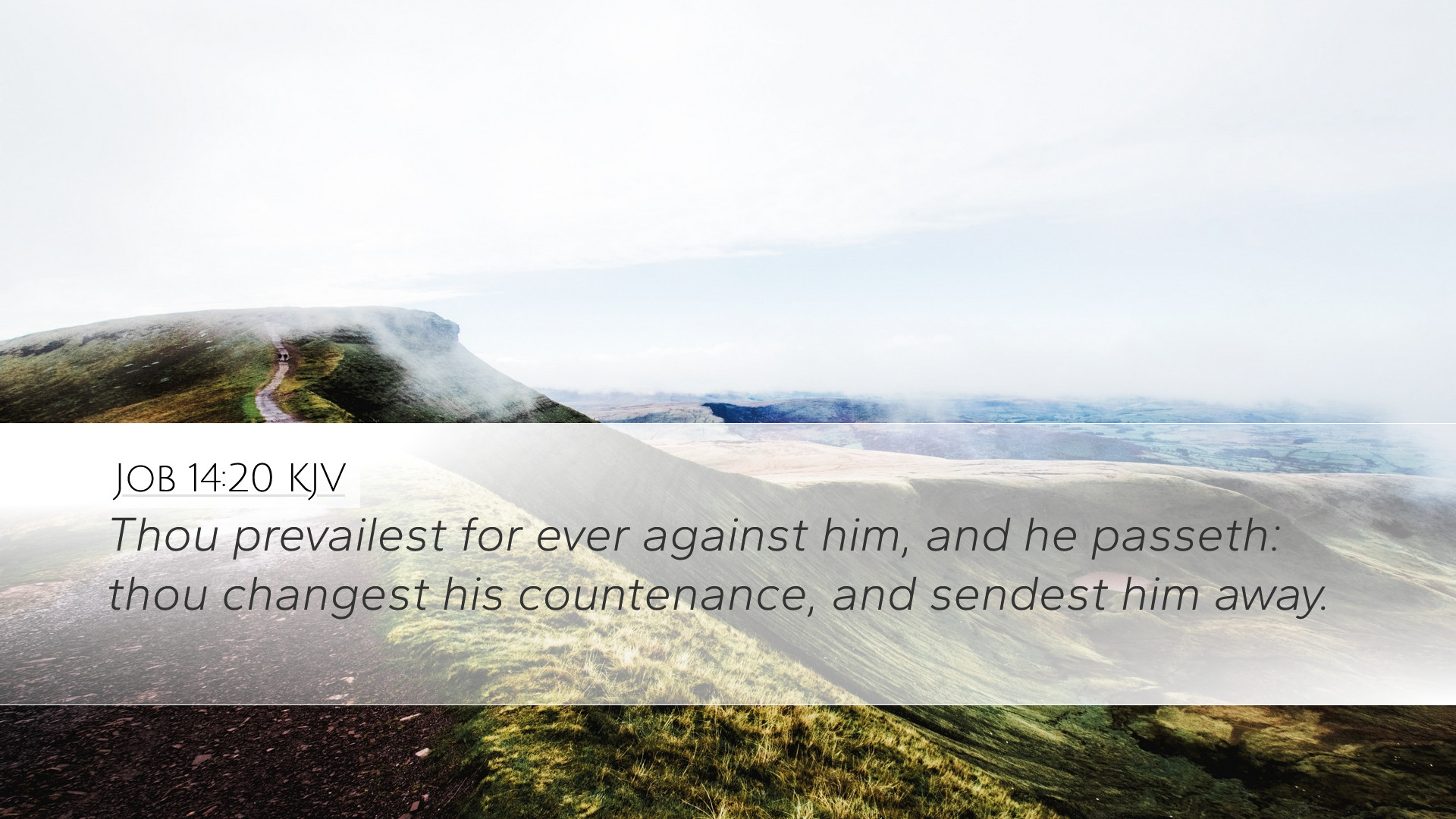Old Testament
Genesis Exodus Leviticus Numbers Deuteronomy Joshua Judges Ruth 1 Samuel 2 Samuel 1 Kings 2 Kings 1 Chronicles 2 Chronicles Ezra Nehemiah Esther Job Psalms Proverbs Ecclesiastes Song of Solomon Isaiah Jeremiah Lamentations Ezekiel Daniel Hosea Joel Amos Obadiah Jonah Micah Nahum Habakkuk Zephaniah Haggai Zechariah MalachiJob 14:20
Job 14:20 KJV
Thou prevailest for ever against him, and he passeth: thou changest his countenance, and sendest him away.
Job 14:20 Bible Commentary
Commentary on Job 14:20
Verse: "Thou prevailest for ever against him, and he passeth: thou changest his countenance, and sendest him away."
Introduction
The Book of Job presents one of the deepest contemplations on human suffering and divine sovereignty. Job 14:20 encapsulates a pivotal moment wherein Job reflects on the transient nature of life and the omnipotence of God that prevails over humanity. In this commentary, we draw insights from notable public domain theologians, namely Matthew Henry, Albert Barnes, and Adam Clarke, to provide a comprehensive understanding suitable for pastors, students, theologians, and Bible scholars.
The Nature of Human Existence
Matthew Henry emphasizes the frailty of humanity, comparing human existence to a fleeting vapor. Job, in his anguish, acknowledges that God exercises His sovereignty continually over the lives of men. He notes that humans are destined to pass away, highlighting the inevitable mortality that accompanies all life. This theme resonates deeply within the scriptural narrative, where Job confronts his suffering and the transitory nature of his existence.
Albert Barnes elaborates on the implications of God prevailing against man, noting that God's judgments are unassailable. Job recognizes that God's involvement in human affairs is not arbitrary; rather, it reflects His authority and wisdom. Life's fleeting nature serves as a poignant reminder of the need for humility and reverence before the Creator, who holds dominion over all creation.
God’s Sovereignty and Human Suffering
Adam Clarke addresses the theological facets of Job's statement, particularly focusing on the aspect of divine sovereignty in relation to human suffering. Clarke affirms that God's ability to "change his countenance" symbolizes divine intervention in human life. When God reconfigures one’s situation or emotional state, it serves as a testament to His power to dictate the course of life, even amid adversity.
- Divine Control: The verse underscores God's control over human conditions, suggesting that He has the authority to decide when one faces trials or relief.
- Human Desperation: Job's lament resonates with anyone who experiences despair, reinforcing the idea that suffering is a universal aspect of the human condition.
Theological Implications of Job 14:20
This verse provokes significant theological reflection regarding the relationship between God and humanity. Job's assertion can be interpreted on several levels:
- Perseverance of Trials: The constancy of trials in one’s life reflects God’s overarching plan, which often surpasses human understanding. This teaches believers the value of perseverance and dependence on divine grace.
- Transformation through Suffering: The notion that God “changes his countenance” suggests that suffering can lead to transformation. This transformation might not manifest immediately but is part of a larger divine design.
- Hope beyond Despair: Despite acknowledging the hardships, recognizing God’s ultimate authority offers a glimmer of hope. The passage encourages readers to trust in God’s sovereignty amidst life’s turbulent circumstances.
Practical Applications
The insights gleaned from Job 14:20 can offer significant comfort and guidance for individuals grappling with suffering:
- Understanding Suffering: Pastors and students of the Bible should recognize suffering as a process through which God may be working to refine character and faith.
- Acknowledging God's Sovereignty: It is vital to encourage oneself and others to acknowledge God’s sovereignty, leading to greater peace amid uncertainty.
- Fostering Empathy: The theological understanding of suffering allows believers to cultivate empathy for those who are suffering, providing solace and support as Christ did.
Conclusion
Job 14:20 serves as a profound exploration of human existence, divine sovereignty, and the realities of suffering. By integrating the perspectives of Matthew Henry, Albert Barnes, and Adam Clarke, we gain deeper insights that can enrich the sermons, teachings, and personal studies of anyone engaged with the Scriptures. The complexities of life’s sufferings are met with the hope that, while God prevails against humanity in sovereignty, His transcendence does not preclude His compassion and care for His creation.


